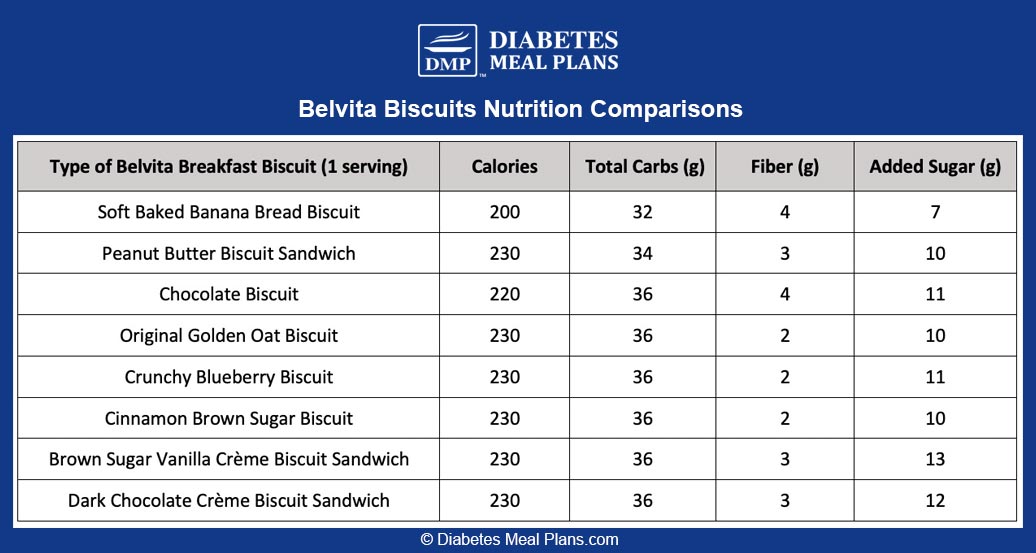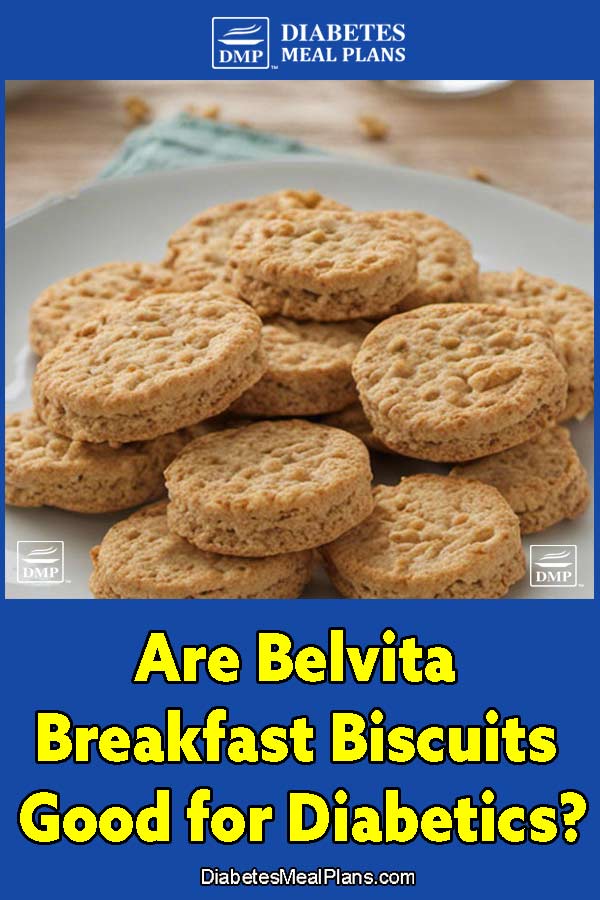Belvita boldly advertises that their breakfast biscuits support “steady energy, all morning long to help you rise and thrive.”
Does Belvita promise more than it can deliver?
Let’s see how accurate this claim really is…
Nutrition Facts for Belvita Biscuits
Belvita sells boxes of thin, crunchy biscuits with 4 biscuits in each “pack.”
One “pack” is considered a standard serving size.
Here’s what you’ll get in one serving (50g) of the original golden oat Belvita biscuits:
- Calories: 230
- Total Carbohydrates: 36g
- Added Sugar: 10g
- Fiber: 2g
- Protein: 3g
- Fat: 8g
Yes, you read that correctly…that’s 36g of carbs (including 10g from added sugar) per serving!
The serving size may seem a little large, so what if we cut those 4 biscuits down to just 1?
If you ate just ¼ of the serving size, you would still have 9g of carbs and 2.5g of added sugar, with less than 1g of protein or fiber.
Sure, these biscuits do contain whole grains as advertised (rolled oats and enriched wheat flour), but they also contain two forms of added sugar (“sugar” and “malt syrup”).
Belvita claims that their product is made of “wholesome grains” and “slow-release carbs” that won’t spike your blood sugar. Is this true?
In a moment, we’ll talk in-depth about the effects that added sugar and whole grains have on blood sugar.
But first, let’s see how other biscuits from the same brand compare…
Comparing Breakfast Biscuits
Belvita offers a range of breakfast biscuits from their original golden oat to blueberry flavored to double-layered crème “sandwiches.”
Are all these products off-limits or are some of them diabetes-friendly?

A quick scan down this nutrition chart should tell you all you need to know: these biscuits are just sugar, sugar, sugar disguised as a healthy breakfast treat.
Ranging from 32 to 36g of carbs per serving, not one of these options would pass the test when it comes to blood sugar stability.
For someone on a low carb diet, just one serving could eat up half their carbs for the day (while providing no meaningful nutrients)!
Now let’s compare these biscuits to a healthy, low carb breakfast like this mixed veggie scramble.
The fun part about a breakfast scramble is that it can be upgraded with fresh avocado slices and diced tomatoes for a boost in healthy fats and delicious flavor!
This breakfast racks up just 22g of total carbs and zero added sugar, plus 12g of fiber, 25g of healthy fat, and over 15g of protein.
Now that’s a great way to start your day!
Research on Grains and Type 2 Diabetes
It’s time for a “fact check” on Belvita’s claims about their breakfast biscuits.
Belvita is not advertised as a food specifically for people with diabetes, but they still make lofty claims that their grain and sugar-laden biscuits will provide stable energy throughout your morning.
For people without insulin resistance, there is mixed evidence on the effects of a sugary or grain-based breakfast.
But for people with impaired glucose tolerance, the evidence is clear!
The combination of grains and added sugar can be detrimental to those with prediabetes or type 2 diabetes.
Here’s what the research says:
- Let’s start with sugar. Research finds that a high intake of sugar is associated with cardiovascular disease, obesity, and chronic inflammation. With insulin resistance (a feature of diabetes) your body already struggles to process carbohydrates. Why add gas to the fire by eating added sugars at breakfast?
- There’s also a wealth of evidence demonstrating that low carb diets (excluding grains, even whole grains) are effective for improving type 2 diabetes and metabolic syndrome.
- Again and again, carbohydrate restriction (especially when combined with regular physical activity) is linked to lower blood sugar levels in people with type 2 diabetes.
- Excess carbs in the diet contributes to consistently high blood sugar levels in people with diabetes. This results in chronic inflammation, a high HbA1c, and potential complications.
- Lastly, a study found that a high fat, very low carbohydrate breakfast produced lower and more stable blood sugar levels throughout the day than a higher carb breakfast did. The high fat, low carb breakfast also reduced pre-meal hunger levels throughout the day.
If that’s not enough reasons to skip the breakfast biscuits, just think about the fact that the average American already consumes roughly 22 teaspoons of added sugar per day and that the average Western diet derives more than 13% of its calories from added sugar.
We don’t need any more sugar in our diets, especially at breakfast!

Recommendations for Belvita and Type 2 Diabetes
Belvita’s advertising claims make their biscuits sounds like a blood sugar-stablizing goldmine, but contrary to their advertising, these biscuits just don’t hit the mark.
In fact, they’re no better than a bowl of processed breakfast cereal (if you don’t already know our opinion on that, you can read up on it here).
So, what should you eat for breakfast?
Aim for foods that are low carb, with plenty of protein, fiber, and fat. This will set you up for all-day energy!
Here are a few healthy, low carb breakfast ideas to get you started:
- Try the mixed veggie egg scramble we mentioned earlier – it’s a favorite for a reason!
- Want to try something outside the box? Take a chance on our hearty “big breakfast” pizza!
- For something sweet, whip up a breakfast smoothie that’s low carb and loaded with healthy fats
- If you love a classic berry parfait, give our low carb version a try
- Still need more ideas? Check out the rest of these low carb breakfast recipes!
What you eat has the most significant impact on your blood sugar and A1c, so don’t leave it to chance! Grab our food list and get started the right way so you can lower A1c, weight and medications with our proven methods.

Micah
I am so angry that belvita is allowed to market its biscuits as slow-release carbohydrates when, in actuality, they are DANGEROUS for diabetics. Well-intended diabetic patients who are trying to eat responsibly are being deceived to serve the financial bottom line. Not only is belvita’s deceptive labeling symptomatic of corporate greed, it is just plain cruel.
Dr Jedha - Nutritionist (PhD)
Agreed Micah, it is irresponsible and a terrible issue in our food system that shouldn’t be happening!